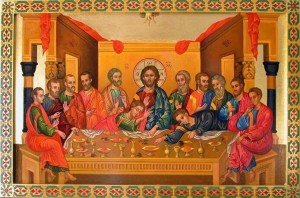One of the key ideas in understanding the Divine Liturgy is, as I shared in the last several issues of this article, is the idea of Anamnesis – the ritual act of bringing a past action into the present. A clear example of Anamnesis in this Christian context, within possibly the earliest written references to the Last Supper and its implications for Christ’s disciples, is found in 1 Corinthians 11:24-25. In consecutive verses, the St. Paul uses different forms of the noun ἀνάμνησις, ἀνάμνησιν. Paul commands the Corinthians concerning the bread that has become Christ’s body, and then again concerning the cup of wine transformed into “the new covenant in [Christ’s] blood” (v 25). Paul reinforces the twofold directive by placing it in the mouth of the Lord himself: “Do this in remembrance of me” (τουτο ποιειτε εἰς την ἐμην ἀνάμνησιν) (vv 24-25). Without using the term Anamnesis again, Paul further explains Christ’s command to commemorate the Last Supper through a communal meal that is at once an act of Anamnesis and of eschatological anticipation, that is an anticipation of the celebration of Christ’s presence in the age to come. Partakers in this meal are transformed by it as both Christ’s past gift of self and future second coming are brought into the present encounter with the Lord: “For whenever you eat this bread and drink this cup, you proclaim the Lord’s death until he comes” (v 26). In 1 Corinthians 11:24-26, Anamnesis is connected with covenant; the cup in particular is said to be “the new covenant in Christ’s blood.” This confluence of covenant and Anamnesis is not a Christian novelty. Indeed, a strong connection between Anamnesis and covenant exists in ancient Israelite tradition and is central to several Old Testament texts: Exodus 13:8 and Deuteronomy 6:28 ‒ wherein this covenant-anamnesis link is clear. In Exodus 13:8, the LORD instructs Moses: “On this day you shall explain to your son, this is because of what the LORD did for me when I came out of Egypt. This covenant, by which God granted Israel “the land of Canaan” (Exodus 6:4) is again remembered and applied to the relationship between God and Israel in the present tense in Deuteronomy 6:28: God brought us from there to lead us into the land promised on oath to our ancestors and to give it to us.
So we see the Jewish influence on the ritual we perform which we call the Eucharist – Our Thanksgiving to God.

